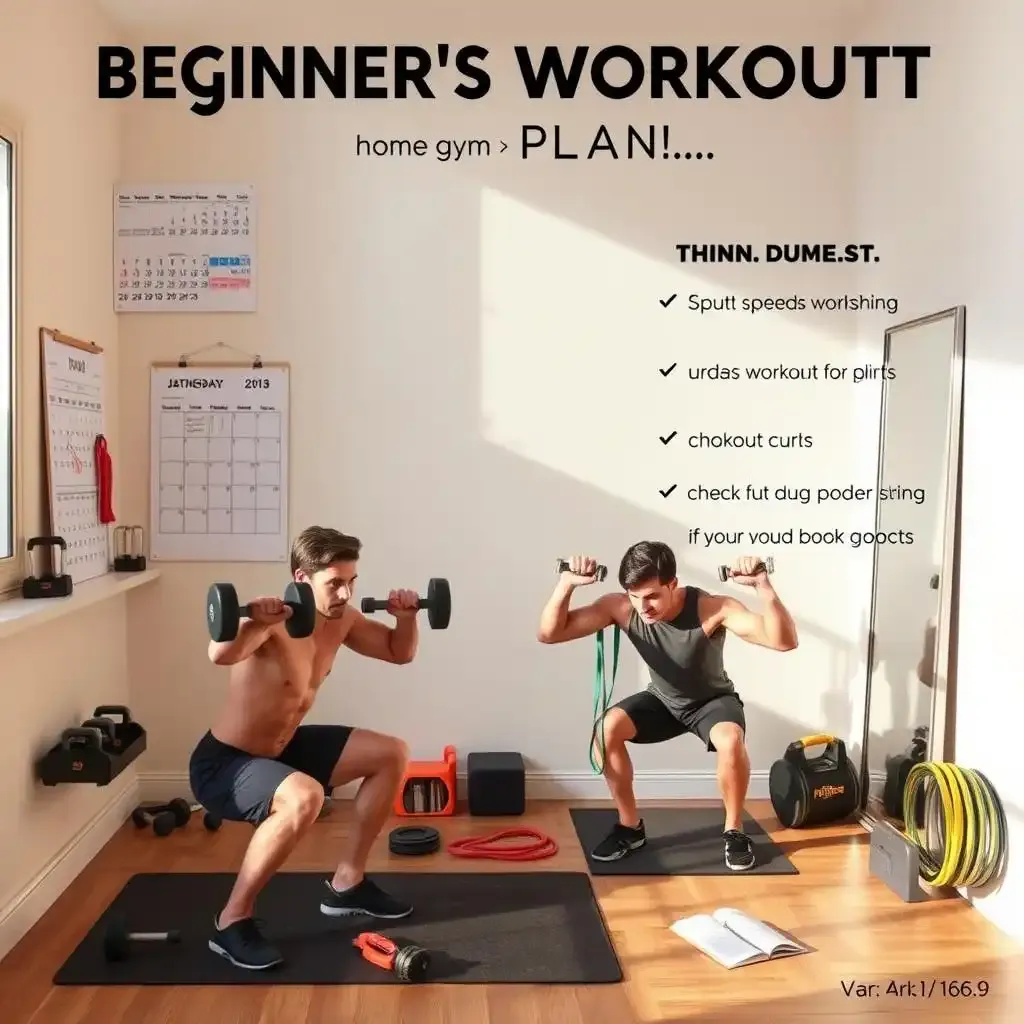Table of Contents
Starting a fitness process can feel overwhelming, especially when you're new to the gym scene. A well-structured beginner workout plan for men is your roadmap to success, helping you build strength, gain muscle, and boost confidence. I've helped hundreds of beginners transform their bodies, and I understand the challenges you're facing. Whether you're picking up weights for the first time or returning after a long break, this comprehensive guide will walk you through everything you need to know. We'll cover the essential exercises, proper form, and progression strategies that will help you build a strong foundation. The best part? You don't need fancy equipment or hours in the gym to see results. This plan is designed to work with your schedule while delivering maximum results. Let's break down the fundamentals of building your perfect workout routine, one step at a time.
1. Essential Components of a Beginner Workout Plan for Men
Setting Up Your Workout Foundation
When I first started working out, I made the mistake of jumping straight into complex exercises. Trust me, that's not the way to go. Your beginner workout plan for men needs a solid foundation. Start with 3-4 workouts per week, giving your body time to rest and recover. Each workout should last 45-60 minutes. Think of it like building a house - you need a strong base before adding the fancy stuff.
Understanding Basic Equipment Needs
You don't need fancy gear to get started. I've seen amazing results with just basic equipment. Here's what you'll need for a complete home gym setup:
- A pair of adjustable dumbbells
- A sturdy exercise mat
- Resistance bands
- A pull-up bar (optional but recommended)
Proper Form and Technique
I can't stress this enough - form is everything! When I work with beginners, I always say it's better to do 5 perfect reps than 15 sloppy ones. Your weekly workout routine should focus on mastering basic movements first. Use mirrors to check your form, or better yet, record yourself.
Exercise Type | Focus Points | Common Mistakes |
|---|---|---|
Push-ups | Straight back, elbows at 45° | Sagging hips, flared elbows |
Squats | Knees in line with toes | Knees caving in, heels lifting |
Rest and Recovery Planning
Here's something many beginners miss - rest is when you actually grow stronger. I learned this the hard way! Following a structured 30-day plan helps you balance work and recovery. Aim for 7-8 hours of sleep each night, and don't work the same muscle groups two days in a row.
Nutrition Basics
Your workout results are 80% kitchen, 20% gym. I've seen countless guys nail their workouts but fail to see results because of poor nutrition. Track your protein intake (aim for 1.6-2.2g per kg of body weight) and stay hydrated. Keep it simple:
- Eat whole foods
- Include protein in every meal
- Drink water throughout the day
- Limit processed foods and sugary drinks
2. Building Your First Beginner Workout Plan for Men: A StepbyStep Guide
2 Building Your First Beginner Workout Plan For Men A Stepbystep Guide
Creating Your Weekly Schedule
I started my fitness process with a simple 3-day split, and that's what I recommend for your . Pick Monday, Wednesday, and Friday for your workouts. This gives your muscles enough time to recover between sessions. Start with 45-minute workouts - trust me, quality beats quantity when you're beginning.
- Monday: Full body basics
- Wednesday: Upper body focus
- Friday: Lower body emphasis
- Tuesday/Thursday/Weekend: Rest and light stretching
Setting Up Your Home Gym Space
You don't need a fancy gym membership to get started. I've helped many guys create effective . Clear out a corner in your room - about 6x6 feet is plenty. Make sure you've got good lighting and maybe a mirror to check your form. I started in my garage with just basic equipment, and it worked great!
Exercise Type | Equipment Needed | Space Required |
|---|---|---|
Bodyweight | Exercise mat only | 6x6 feet |
Dumbbell | Adjustable weights | 6x8 feet |
Resistance Band | Band set | 6x6 feet |
Tracking Your Progress
Here's something I wish someone had told me when I started: track everything! Use a workout tracking app to record your sets, reps, and weights. Take progress photos every two weeks - they're way more reliable than the scale. I still remember how surprised I was looking at my first month's progress photos!
- Take photos from front, side, and back
- Record your workout numbers each session
- Measure key body parts monthly
- Keep a mood and energy journal
3. Key Exercises in a Beginner Workout Plan for Men
3 Key Exercises In A Beginner Workout Plan For Men
Foundation Movements for Strength
Let's start with the basics that will build your strength foundation. When I first started my home workout progression, I focused on five key exercises. Push-ups build chest and arm strength - start with wall push-ups if regular ones are too tough. Squats strengthen your legs and core - just use your body weight at first. Pull-ups might seem scary, but you can begin with negative pull-ups (jumping up and lowering slowly). Planks build core strength, and lunges improve balance and leg ability.
Exercise | Starting Reps | Target Areas |
|---|---|---|
Push-ups | 5-10 | Chest, Arms, Shoulders |
Squats | 10-15 | Legs, Core |
Pull-ups | 2-5 | Back, Arms |
Progressive Training Methods
I've learned that progress comes from smart progression, not just working harder. Following a helps track your improvements. Start each exercise with 2 sets of 8-12 reps. Once that feels easy, add another set or increase reps. For example, I started doing just 3 push-ups, but after four weeks of consistent practice, I could do 15 perfect ones! Remember, form beats numbers every time.
- Week 1: Focus on form with basic variations
- Week 2: Increase reps by 2-3 per set
- Week 3: Add an extra set
- Week 4: Try harder variations
4. Common Mistakes to Avoid in Your Men's Beginner Workout Process
4 Common Mistakes To Avoid In Your Mens Beginner Workout Process
Going Too Hard, Too Fast
When I first started working out, I thought more was better. Big mistake! Your should start slow. I've seen guys try to lift heavy weights on day one, then get so sore they quit by week two. Start with bodyweight exercises and light weights. Your muscles need time to adapt, just like learning to ride a bike - you don't start with tricks!
- Start with 2-3 sets instead of 5
- Choose weights you can lift for 12-15 reps easily
- Rest between sets for 90 seconds
- Listen to your body's signals
Skipping Proper Form
Here's something I learned the hard way - bad form can wreck your progress. I see this all the time in my home workout sessions. Guys swing weights around like they're in a race, but proper form beats speed every time. Think of it like building with LEGOs - each piece needs to fit perfectly, or the whole thing falls apart.
Exercise | Common Form Mistake | How to Fix It |
|---|---|---|
Push-ups | Sagging hips | Keep body straight as a board |
Squats | Knees caving in | Push knees outward |
Pull-ups | Half reps | Full range of motion |
Inconsistent Training Schedule
The biggest killer of progress? Random workouts. I created a free workout schedule because I know how important consistency is. Think of your workout plan like feeding a pet - you wouldn't feed them whenever you feel like it, right? Your muscles need regular training to grow stronger. Pick three days a week and stick to them, rain or shine.
- Set specific workout days and times
- Put workouts in your calendar like meetings
- Pack your gym bag the night before
- Have a backup plan for busy days
5. Progressing Your Beginner Workout Plan for Maximum Results
5 Progressing Your Beginner Workout Plan For Maximum Results
Smart Progressive Overload
Let's talk about making real progress with your . I remember when I first started, I thought lifting heavier weights was the only way forward. But here's the truth - progressive overload isn't just about weight. You can progress by adding one more rep, reducing rest time, or improving your form. Start by mastering basic moves with perfect form, then gradually increase the challenge. Think of it like building with blocks - you add one piece at a time, making sure each addition is solid before moving on.
Progress Type | Week 1-2 | Week 3-4 |
|---|---|---|
Push-ups | 5 reps x 3 sets | 8 reps x 3 sets |
Squats | 10 reps x 2 sets | 12 reps x 3 sets |
Measuring Success Beyond Numbers
Your fitness process isn't just about getting stronger - it's about feeling better too. I use a to record more than just reps and sets. Track your energy levels, sleep quality, and how your clothes fit. These small wins add up! Yesterday, one of my clients noticed he could climb stairs without getting winded - that's real progress! Remember, every small improvement counts, whether it's doing one more push-up or holding a plank for five extra seconds.
- Take weekly progress photos
- Record your energy levels daily
- Note how your clothes fit
- Track your sleep quality
- Monitor your recovery time